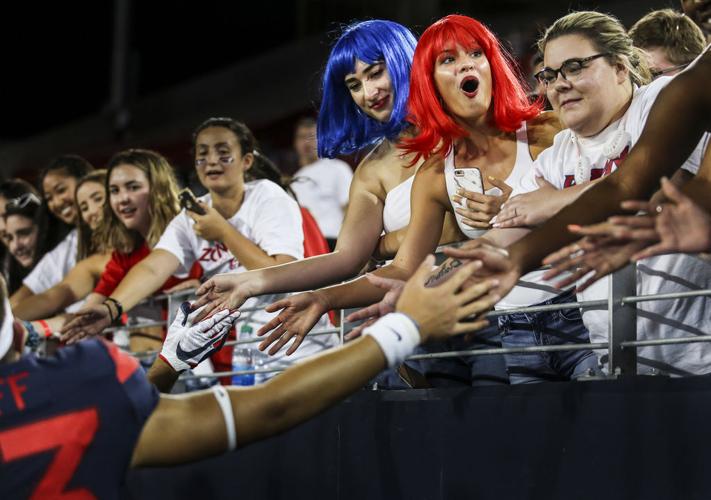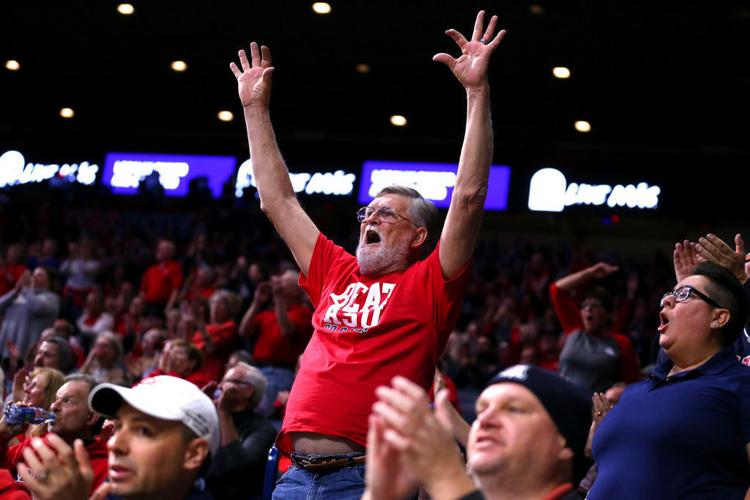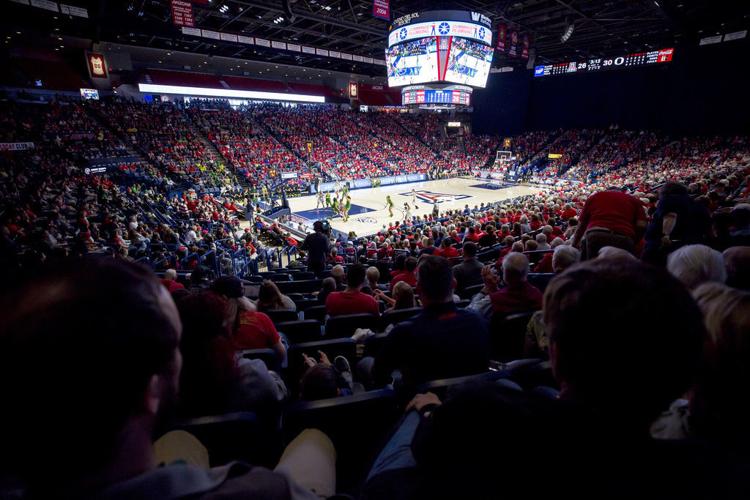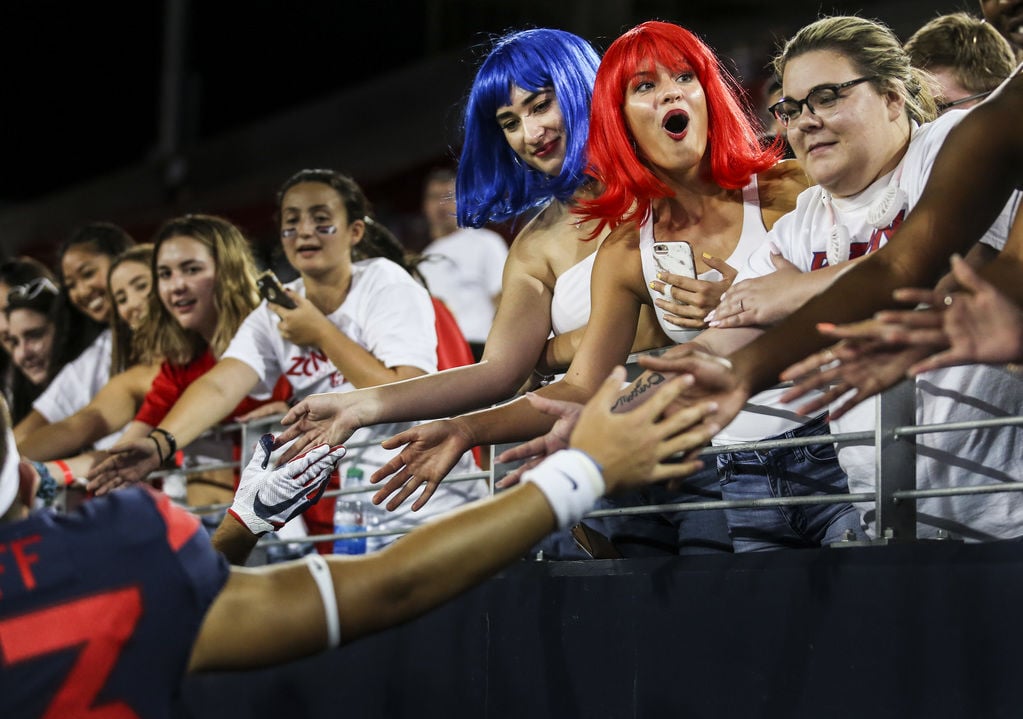In 1997, David Wohl and his late wife moved to Tucson from Cincinnati, where she had been teaching law. Six months earlier, the Arizona Wildcats had defeated Kentucky to win their first and only national title in men’s basketball.
When he announced he was resigning from the nonprofit he was running to come west, Wohl was asked by a local reporter about the move.
“Cincinnati only made it to the Final Four (in 1992),” Wohl replied. “Arizona won the championship.”
Wohl’s UA fandom actually began before his late wife, Jean Braucher, became a professor at the school.
“UC was full of UK fans,” he said. “I was not among them. By default, I was for Arizona.”
About 10 years later, Wohl and Braucher became season-ticket holders at McKale Center. Wohl has been cheering for the Wildcats in person ever since. His pair of seats are in Section 19, adjacent to the ZonaZoo.
But with the coronavirus pandemic persisting, Wohl didn’t feel comfortable with the idea of attending UA games in 2020-21. He turns 67 in September, putting him in the high-risk group for severe illness.
Wohl also didn’t want to lose his seats or his status. So earlier this month, he began emailing university officials with a specific appeal.
“I wanted the flexibility to take what I called in my request a ‘sabbatical’ – basically take one year off,” Wohl said in a phone interview this week. “I did not want to lose all the credit I had built over the years.”
Two weeks and several emails from Wohl later, the UA announced a new policy: Season-ticket holders concerned about their well-being could keep their seats for the 2021 football and/or ’21-22 men’s basketball seasons by putting down a minimum 25% deposit toward renewal for those campaigns.
The UA athletic department and ticket office have been working on contingencies since the pandemic shut down college sports in mid-March. So Wohl isn’t about to take credit for the change, nor does he want to. He’s just glad the UA “did the right thing” to accommodate him and others who might feel the same way.
“I’m not going to put myself in anybody else’s head,” Wohl said. “I’m not going to claim responsibility, credit, whatever. The bottom line is, they have said they will do exactly what I hoped they would do.
“I’m not suggesting it was an easy decision. There’s a huge amount of revenue at stake that they rely on. It’s a really fluid situation. They’re in a very tough position.
“I don’t think they did anything wrong. They had to work through a process, and ultimately they made the correct decision.”
Loyalty reciprocated
The predicament Wohl persistently pointed out isn’t the first the UA athletic department and ticket office have faced over the past two-plus months, and it undoubtedly won’t be the last.
Like any other business struggling to remain viable, athletic director Dave Heeke and his staff are trying their best to please their customers – even if it takes a little nudging sometimes.
From the moment the pandemic crumpled the sports calendar, Chris Celona, the UA’s associate athletic director for ticket sales and customer relationship management, and his team have emphasized flexibility. They have focused on coming up with answers to one simple question, Celona said: “How can we make it easier on our fans?”

Arizona Wildcat and Oregon Duck fans watch during the second quarter of the No. 18 Arizona Wildcats 71-64 loss to No. 2 Oregon Ducks at McKale Center in Tucson, Ariz. on January 1, 2020. The attendance at McKale was 7,680.
First steps included offering baseball and softball ticket holders the ability to use the money already spent on canceled games for future UA sporting events; extending the deadlines for football and basketball season-ticket renewals from May 1 to June 1; and extending and expanding payment-plan options.
Refunds also are available. Season-ticket holders seeking them must submit their requests in writing by Aug. 7 for football or Sept. 7 for basketball.
If you already have renewed or are making payments, those same deadlines apply for pursuing the future-deposit plan. Those who haven’t renewed yet and are thinking about skipping the upcoming season(s) must contact the McKale Ticket Office or their sales rep by June 1.
Regarding the latest change, which the UA announced Wednesday, Celona agreed with Wohl that it was simply the right thing to do.
“It’s obviously an unprecedented situation,” Celona said. “Our season-ticket holders have been so loyal to us over the course of so many years, it’s important that we’re loyal to them as well.”
When Wohl didn’t initially get the answers he was seeking, he sent additional emails up the chain of command. Recipients included Heeke and school president Robert C. Robbins.
Heeke wrote back to Wohl on May 16, revealing that the option he had requested soon would become an official policy.
“We’re all in this thing together. We all want the Wildcats to be successful. And we all play a little different part in that,” Heeke told the Star this week.
“I receive a lot of advice from our fans, feedback, suggestions. I appreciate that. It gets us thinking. It opens our eyes a little bit, gives us a pulse on what people are feeling out there.
“We genuinely read all of those emails, and we try to react the best we can. We can’t always meet everyone’s requests or their desires exactly. But certainly we will always consider their input and take that into consideration as we make our final decisions going forward. And that’s what we tried to do here.”
Limited capacity
The reality is, the UA likely won’t be able to oblige all of its season-ticket holders who want to attend games during the upcoming academic year.
Part of the UA’s re-entry planning focuses on facilities and competitions. Neither Arizona Stadium nor McKale Center is expected to be operating at full capacity as the UA implements social distancing and other safety measures.
“Nothing’s been finalized,” Heeke said. “We still have 95 or so days before we play a game. (Arizona is scheduled to open the football season Aug. 29 against Hawaii.)
“But … it does seem to trend toward a limited-fan-engagement model and certainly different protocols for entry into the stadium, for exiting out of the stadium.”

A fan cheers on the UA women’s basketball team during a January game against Oregon State. Season ticket holders have options starting this fall.
Ohio State athletic director Gene Smith said this week that he expected the Buckeyes to be able to host as few as 22,000 fans and as many as 50,000 – if current guidelines are relaxed – at 104,944-seat Ohio Stadium. Heeke cited similar percentage projections for Arizona Stadium, which holds 50,782.
“At this point, with the information we have, I don’t foresee the ability to open the full stadium to capacity,” Heeke said. “It would be significantly less than that. Numbers have ranged anywhere from 20% to 50% or 60%. I think it’s probably trending to the lower side.”
The UA had just over 17,000 paid season-ticket holders for football last season. It had over 10,000 for men’s basketball at 14,655-seat McKale Center. Even if the arena’s capacity were at 60%, maximum attendance would be under 9,000.
Celona declined to reveal current renewal rates, citing the revised purchasing deadlines and the overall uncertainty caused by the pandemic.
Wohl already has paid his deposit for 2021-22 basketball season tickets, preserving his seats but leaving him out of the loop for ’20-21.
Would he consider attending a game or two this season?
“If there’s a way it can be done safely,” Wohl said. “God knows I don’t want to get all of my basketball delivered to me by Bill Walton.”







